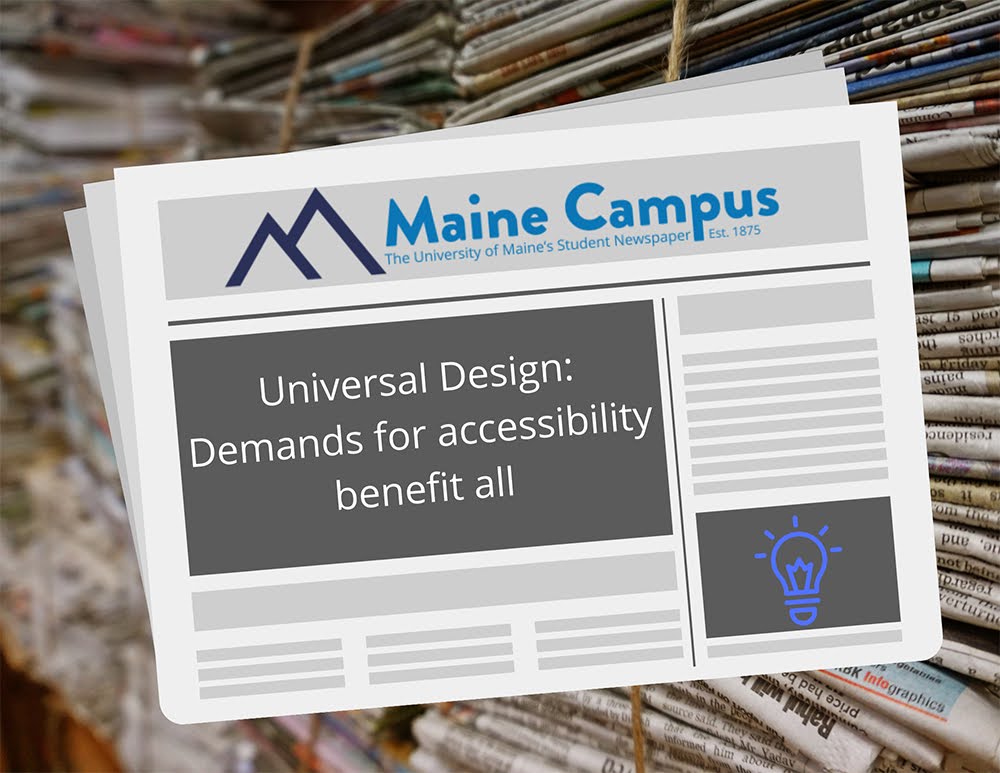The first day of the 2022 spring semester at the University of Maine opened in chaos. Students found themselves forced to traverse thick layers of ice without salt or sand on their way to class, and took to social media to express their indignation with the lack of preparedness on campus for winter conditions. While some students were primarily concerned about being seen slipping on the slick walkways, others brought up worries about accessibility for students who have limited vision or mobility and may have been unable to navigate the ice traps on sidewalks.
One student anonymously expressed their criticism on the social media app YikYak, describing a conversation they had with their roommate about “how impossible [commuting] would be for anyone with mobility aids” that day. The situation that unfolded was more than an inconvenience for many, and serves as an example of the benefits of universal design on college campuses.
Student Accessibility Services (SAS) at one time provided an “access van” to make getting around campus more accessible for students with certain documented disabilities. On days like the opening of the semester, where such students would have difficulty navigating winter conditions, that service would have been available. However, even prior to the cancellation of the service due to the COVID-19 pandemic, students had to previously arrange for the access van to be included in their list of accommodations––something that cannot be done in the time between one’s discovery that walkways are unable to be navigated that morning and the start of their first class.
If disabled students were to be considered first when preparing for weather events and designing features of the campus, such as proactively treating walkways before class times, all students would see improvements in their experience. This differs from the current reality, where students are often left to arrange their own accommodations by going outside of what is offered by UMaine, despite the university being required by law to provide equal access to postsecondary education for students with disabilities.
As opposed to formal accommodations for students through SAS, universal design is the process of making environments, by nature of their design, accessible to people with a wide range of ability. Some features of universal design are already prevalent in many places, and the benefits of such design are enjoyed by disabled and abled individuals alike. Examples include curb cuts and push-button door openers; while they are necessary for individuals with limited mobility, they are also useful for individuals carrying large loads, pushing strollers or pulling wheeled suitcases. Ramps, implemented for use by individuals with wheelchairs, are also enjoyed by the general public as a less intensive alternative to stairs. In this way, universal design is meant to increase accessibility in as many ways as possible for as many people as possible, without the need to arrange formal accommodations as frequently, if at all.
The University of Maine should pursue implementing accessible designs throughout the campus to enhance the experiences of everyone. By planning with consideration for those with the most needs, the majority with fewer needs are inherently considered. For example, the University of Syracuse is constructing heated sidewalks to enhance winter accessibility. “The expanded services are the result of Facilities Services’ commitment to improve access to campus during winter conditions, and conversations between Pete Sala, vice president and chief campus facilities officer, and William Myhill, interim Americans with Disabilities Act (ADA) coordinator,” reports the News Staff for the University of Syracuse. A move which is designed to benefit students with accessibility needs ultimately benefits the safety of all students.
The University of Maine should strive to adopt universal design as it both reduces stigmas and barriers around accessible accommodations and equalizes a given environment to a shared level of usability.









